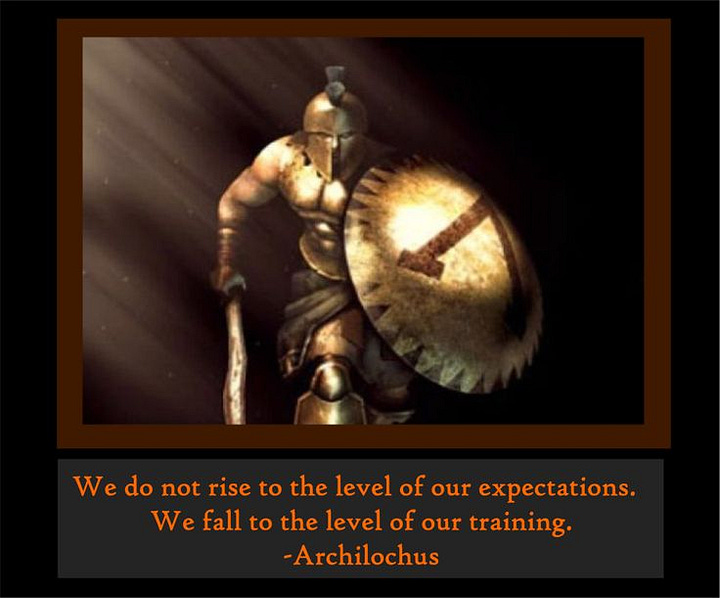Remember Paros: the warrior-poet Archilochus
Loose notes on his life and verse, and the quote "We don't rise to the level of our expectations, we fall to the level of our training."




Fitness bros love this quote attributed to Archilochus: "We don't rise to the level of our expectations, we fall to the level of our training."
That quote covers the Instagrams of dojos and fitness gyms the country over. It's not real. At best it's a distillation of ideas taken from other ancients talking about Archilochus. Very little of his actual work remains to us.
Here are some notes about the warrior-poet Archilochus (who I casually admire, for the record).
His name is probably a nom de plume, and means something like "Master Sergeant", which the gym bros would definitely love.
He was famous but controversial in his own time. After his death, he would be mentioned in the same breath as Hesiod and Homer.
The Spartans banished his works. They thought his cynicism regarding courage might weaken the moral frames of their children.
Some Thracian is delighting in my shield, which I left beside a bush, a flawless piece of gear, though I didn’t want to abandon it. But I saved myself. What do I care about that shield? Let it go; I’ll get another one just as good soon enough.
Or, as translator Stuart Silverman put it:
I don't give a damn if some Thracian ape strut Proud of that first-rate shield the bushes got. Leaving it was hell, but in a tricky spot I kept my hide intact. Good shields can be bought.
His approach was uniquely personal, and his cynicism often turned melancholy.
I, returned, seek an honest woman ready to be a good wife. I would hold your hand, would be near you, would have run all the way to your house. I cannot. The ship went down, and all my wealth with it. The salvagers have no hope. You whom the soldiers beat, you who are all but dead, how the gods love you! And I, alone in the dark, I was promised the light.
Here is a line that any Vietnam vet would relate to:
Seven dead on the ground, seven enemies caught in the chase: here we are, it took a thousand to kill them!
or
But today, it’s Leophilus who commands. Leophilus is the absolute master. Everything is subject to Leophilus. One hears only Leophilus.
He is credited with popularizing (some even say inventing!) iambic meter. He was acknowledged as a great poet, but the meter he wrote in was seen as satirical, humorous, and usually violent and sexual.
He was a Dionysian. Whatever his "training" or "preparation" involved, it certainly included Dionysian revels, gorging, and orgying. His hometown of Paros initially rejected his poetry as "too iambic", which many read as "too sexual". Dionysian celebrations included phallic worship and processions.
The men of Paros were struck with impotence until they repented, and then they maintained his hero cult for 800 years. They built him a great monument outside of town, which to this day may be found promising a biography in stone of the man, but only a couple of fragments can still be read today.
Forget Paros, its sad figures and this life which we had to draw from the waves.
In 1974 thirty-five lines of his poetry were discovered on one fragment. It is almost a complete poem. It is erotic, a seduction which the woman resists until he promises to ensure she won't get pregnant. It is extremely graphic. Pornographic, even.
Being an iambic poet was a lifestyle. Iambos obligated the poet not only to be ribald, personal, and direct, but also to engage in merciless invective. As his legend grew, so did the number of people said to have killed themselves because of how thoroughly he had destroyed them in verse, including (most famously) the man who had reneged on a promise to provide one of his daughters to Archilochus as a bride. He and all his daughters were said to have committed suicide.
One of his epithets was "fault-finding Archilochus".
The Souda, a much later Greek Christian encyclopedia, had this to say: "He would be a noble poet in other respects if one were to take away his foul mouth and slanderous speech and wash them away like a stain."
Sergeant to Enyalios, the great god War, I practice double labor. With poetry, love's gift, I serve the lady Muses.
He died fighting, whether in a duel or in war we do not know. It is said that the name of the man who killed him was “Crow”, and that Apollo cursed him.
Archilochus said many things, some beautiful, all clever, but as far as I can tell, none of them "We don't rise to the level of our expectations, we fall to the level of our training."
If anyone knows how this one got started, I'd love to know more.





Omond mentioned how the Ancient Greeks and our English meters are reversed in their character. The lamb to them was light and comical sounding, but to us it sounds heroic. Very interesting. I read archilochus in an anthology, but didn't realize he wrote in iambs.
πόλλ' οἶδ' ἀλώπηξ, ἐχῖνος δ'ἓν μέγα
This is my favorite Archilochus quote; it's best translated as "The fox knows many tricks, the hedgehog one good one."